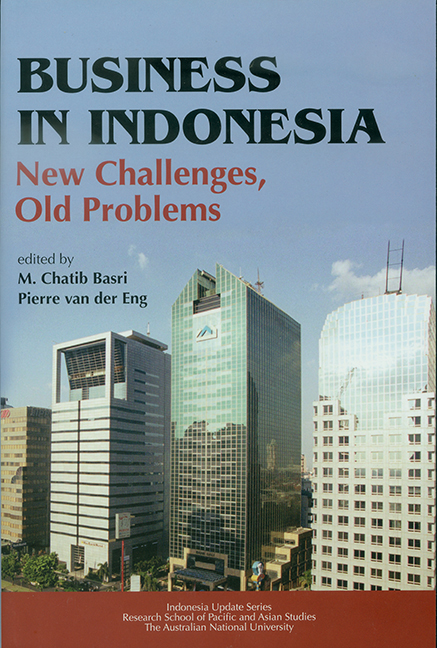Book contents
- Frontmatter
- Contents
- Tables
- Figures
- Contributors
- Acknowledgments
- Glossary
- 1 Business in Indonesia: Old Problems and New Challenges
- PART I Political and Economic Developments
- PART II Overview of the Business Environment
- PART III Foreign Investment and Trade
- PART IV Key Issues in the Business Environment
- 8 The Effects of Decentralisation on Business in Indonesia
- 9 Political Economy of Privatisation of State-owned Enterprises in Indonesia
- 10 Corporate Ownership and Management in Indonesia: Does It Change?
- 11 Tinkering Around the Edges: Inadequacy of Corporate Governance Reform in Post-Crisis Indonesia
- 12 Upholding Indonesian Bankruptcy Legislation
- 13 The Private Sector Response to Public Sector Corruption
- 14 A Challenge for Business? Developments in Indonesian Trade Unionism after Soeharto
- 15 Labour Regulation and the Business Environment: Time to Take Stock
- References
- Index
- Indonesia Update Series
8 - The Effects of Decentralisation on Business in Indonesia
from PART IV - Key Issues in the Business Environment
Published online by Cambridge University Press: 21 October 2015
- Frontmatter
- Contents
- Tables
- Figures
- Contributors
- Acknowledgments
- Glossary
- 1 Business in Indonesia: Old Problems and New Challenges
- PART I Political and Economic Developments
- PART II Overview of the Business Environment
- PART III Foreign Investment and Trade
- PART IV Key Issues in the Business Environment
- 8 The Effects of Decentralisation on Business in Indonesia
- 9 Political Economy of Privatisation of State-owned Enterprises in Indonesia
- 10 Corporate Ownership and Management in Indonesia: Does It Change?
- 11 Tinkering Around the Edges: Inadequacy of Corporate Governance Reform in Post-Crisis Indonesia
- 12 Upholding Indonesian Bankruptcy Legislation
- 13 The Private Sector Response to Public Sector Corruption
- 14 A Challenge for Business? Developments in Indonesian Trade Unionism after Soeharto
- 15 Labour Regulation and the Business Environment: Time to Take Stock
- References
- Index
- Indonesia Update Series
Summary
Indonesia has experienced positive economic growth since 1999 and there are signs of an economic recovery. Still, it is too early to conclude that economic growth is back on track, as most of the recovery so far has been generated by an expansion of private consumption of around 4–5 per cent annually. Investment, on the other hand, has experienced negative growth of between zero and –1 per cent. This pattern may be acceptable for a short period of time, but in the medium to long term it could lead to economic stagnation, high unemployment and social unrest. Given Indonesia's stable macroeconomic conditions and huge market, a key question is why it has not succeeded in attracting more investment, especially foreign investment. In their dialogues with the government, existing and potential investors have mentioned various obstacles to investment, including security problems, lack of law enforcement and a high level of uncertainty. They also mention the ongoing process that will determine the shape of the country in the future: decentralisation. The question that then needs to be asked is whether decentralisation is a major factor contributing to Indonesia's negative investment growth. Although it is easy to point the finger at decentralisation as an obstacle to incoming investment, the security, political and legal problems experienced in Indonesia in 2000–03 may have contributed more to the reluctance of investors to invest there.
This chapter examines the effects on the business community, especially at the local level, of the implementation of decentralisation on 1 January 2001. Although it is difficult to exclude other factors affecting the investment climate, I will at least give information on how the current decentralisation process may have affected the local investment climate and what local governments could learn in seeking to make their regions more attractive to potential investors.
The following section will discuss political, administrative and fiscal decentralisation. The next will present the results of surveys conducted during 2001–02 among samples of local governments. The fourth section will discuss the ‘classical’ but forgotten conflict between the local budget (APBD) and the local economy (as represented by gross regional domestic product, or GRDP). Most local governments tend to focus more on the local budget and on defending their performance before the local legislature, the most powerful body at the local level.
- Type
- Chapter
- Information
- Business in IndonesiaNew Challenges, Old Problems, pp. 125 - 140Publisher: ISEAS–Yusof Ishak InstitutePrint publication year: 2004

